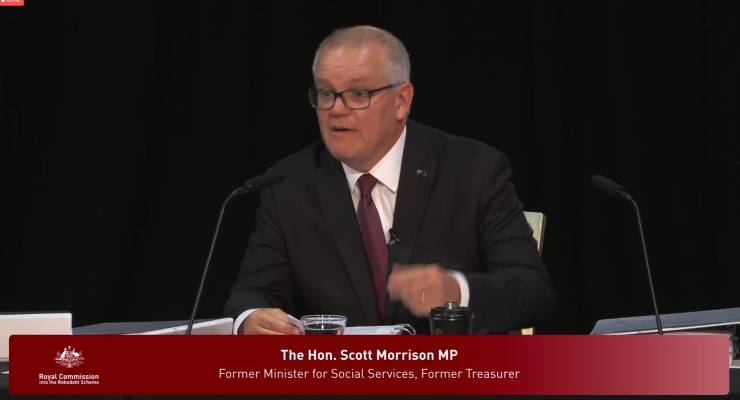
Eight years after the former Coalition government began to craft the robodebt scheme, Scott Morrison has explained why he let the unlawful program go ahead.
The former prime minister, who became social services minister right before Christmas 2014, was told just months into the job by department officials that the scheme required legal changes. Yet the scheme — which used annual tax income information averaged over fortnights to falsely claim hundreds of thousands of welfare recipients owed the government money — was allowed to run for several years.
Morrison spent several hours in the witness chair at the robodebt royal commission into the scheme on Wednesday offering explanations. Here’s why he allowed robodebt to continue.
Legal advice never reached him
Morrison told the commission the “critical failure” was that legal advice sought by bureaucrats before he took charge “was never brought to the attention of ministers”.
I believe there was an obligation and duty to do so.
Department advice changed
In February 2015, a written brief to Morrison flagged the need for policy and legislative change to implement the robodebt system. But when the scheme was presented to cabinet the following month, that advice had changed.
The clear advice given to me, and the advice, therefore, to the expenditure review committee of cabinet was very explicit: there was no legislation required.
Income averaging wasn’t new
Morrison claimed the income averaging method used for robodebt was common and had been used “since 1989”. This has been disputed by other witnesses, and commissioner Catherine Holmes appeared unconvinced. Morrison vowed to produce evidence of this.
Morrison trusted his department
While he conceded that he now understood robodebt was unlawful, Morrison said he never considered it at the time because he trusted his department.
The senior counsel assisting the commission, Justin Greggery KC, put to Morrison the idea robodebt was lawful had been “proven wrong by history”.
Unfortunately, yes. As I said, the suggestion to me that internal department legal advice was not conveyed to ministers was unthinkable.








Morrison is a shoo -in for Arsehat of the Year. Unbeatable, even by that world-renowned Arsehat, Elon Musk.
Indeed. The award this year really needs to be “Other Arsehat of the Year” and not include Morrison as a canddate.
I think Vlad has well and truly topped him none the less
Some people just seem to attract bad luck. Nothing is ever their fault. So they go on a search for a bus to throw somebody else under. Fortunately for the unfortunate and innocent Morrison he has a Department for that purpose.
The man is unable to . . . . . . .
This the same person who publicly initiated the “Seen but not Heard” regime for the APS
He demonstrates a Pell-like understanding of his role: ‘it was something I was not curious about’ (why the legal advice seemed to have changed).
all these unthinkable, unforeseeable events that beset poor Scomo…he was just this poor, trusting soul being misled and kept in the dark!
for shame, you other people you.
Too lazy to take on his (paid) responsibilities with any sort of due diligence.
he was advised by senior officials that due diligence was simultaneously not needed, and had already been applied, and he was shocked….SHOCKED…to find that this was in fact, not the case. He would have been more than happy to apply due diligence, mr speaker, if only he had been asked.
…. If only someone (else) in cabinet had asked ‘which rhododendron’ that caveat had run up?
……..despite a bevy of advisers in his personal office to tell him something wasn’t quite right and that the Department wasn’t doing its job.
Sarcasm injection ceases at this pont.
Most of those advisors aren’t there to tell him things. Their job is to act as a filter between him and the public servants, stopping them from exposing him to inconvenient facts.
As Maxwell Smart, agent 86, used to say to his girlfriend’s warnings of peril ” I told you not to tell me that, 99″.
🙂 🙂 🙂
Gladys said that too.
Yes, but he was very quick to try cutting age pensions as soon as he got that portfolio, until he was toldhe couldn’t so then cut new pensioners from getting energy supplements or discounts. I remember it well and how terrified some of us were at that happening when it was hardly enough to live on as it was.
Ihated him from his first day as SS minister and he’s done nothing to change my opinion every day since. He’s a leach, sucking the life out of everyone who doesn’t worship him.
Love the SS bit.
To too lazy I would add and not very bright.
And too incompetent.
Morrison is just so very full of, err, .. faith. He’s practically bursting with it. Faith in his god, faith in his department(s)’ officials, faith in all that advice. A man of faith. Let this be a warning to us all.
If only the public was paying for an adviser or two – y’know people who could keep an eye out for these possible hazards to his reputation, who could help him avoid them, somehow.
Hold on there …we, the taxpayers of the C of A, are in fact paying for legal assistance to those such as Smirko in appearing before this Royal Commission.